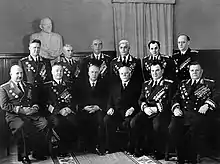Nikolai Pegov | |
|---|---|
 Secretary of the Presidium of the Supreme Soviet of the USSR, N. M. Pegov sitting third from left | |
| Ambassador of the Soviet Union to India | |
| In office 1967–1973 | |
| Preceded by | Ivan Benediktov |
| Ambassador of the Soviet Union to Algeria | |
| In office 1964–1967 | |
| Ambassador of the Soviet Union to Iran | |
| In office 1956–1963 | |
| Personal details | |
| Born | Nikolai Mikhailovich Pegov 3 April 1905 Moscow, Russian Empire |
| Died | 19 April 1991 (aged 86) Moscow, Soviet Union |
| Resting place | Novodevichy cemetery, Moscow |
| Nationality | Russian |
| Political party | Communist Party |
| Alma mater | Moscow Industrial Academy |
Nikolai Pegov (Russian: Николай Пегов; 3 April 1905 – 19 April 1991) was a Soviet official and diplomat. He served as the ambassador to Iran, Algeria, and India. Being a member of the Communist Party he also held various posts at the party.
Early years and education
Pegov was born in Moscow on 3 April 1905.[1][2] His father was a clerk.[3] Pegov began to work in 1919 and joined the Communist Party in 1930.[1] He worked at different factories until 1935 when he enrolled at the Moscow Industrial Academy.[3][4] He graduated from the academy in 1938.[3]
Career
Following his graduation Pegov began his party career and became the secretary of the Far Eastern Regional Committee of the All-Union Communist Party of Bolsheviks.[1][4] In October 1938 he was appointed first secretary of the Primorsky Regional Committee of the All-Union Communist Party of Bolsheviks and in 1940 he was named as the first secretary of the City Committee of the All-Union Communist Party of Bolsheviks in Vladivostok which he held until 1947.[2][4] In 1940 he was also made the first secretary of the Vladivostok city committee of the Azerbaijan Communist Party.[1] In addition, he served as the first secretary of the Maritime Territory Committee from 1938 to 1948.[5] He became part of the Communist Party's Central Committee in 1947 and remained in the post until 1952.[2] He served as the secretary of the central committee between 1952 and 1953.[1] Pegov was elected as the secretary of the Presidium of the Supreme Soviet in April 1954[6] and remained in the post until 1956.[1]
In August 1956 he was named as the ambassador of the Soviet Union to Iran.[7] He served in the post until 1963.[8] One of the significant activities of Pegov during his term as ambassador to Iran was the Iran–Soviet Memorandum concerning the sovereign rights of two countries in the Caspian Sea.[9] This agreement is also known as Aram-Pegov agreement (Aram refers to Abbas Aram, Iranian foreign minister and Iranian signatory of the document),[9] and was signed on 15 September 1962.[10] Then Pegov was appointed Soviet ambassador to Algeria in 1964 which he held until 1967.[1] Pegov was the ambassador of India between 1967 and 1973.[2] He was appointed deputy minister of foreign affairs in April 1973 and department head of the Politburo in 1975.[2]
Pegov also held various posts at the Communist Party. He was a member of the central committee at the 18th through 25th congresses.[3] He functioned a candidate member of the central committee Presidium between 1952 and 1953 and as a deputy to the 1st through 4th convocations of the Supreme Soviet.[3] In December 1982 he retired from politics and public posts.[1]
Death
Pegov died in Moscow on 19 April 1991 and was buried there at the Novodevichy Cemetery.[1]
Awards
Pegov was the recipient of the Order of Lenin for four times and the Order of the October Revolution.[3]
References
- 1 2 3 4 5 6 7 8 9 "Пегов Николай Михайлович" (in Russian). State Budgetary Institution of Culture. Retrieved 1 February 2023.
- 1 2 3 4 5 "Николай Михайлович Пегов" (in Russian). Hrono. Retrieved 1 February 2023.
- 1 2 3 4 5 6 "Pegov, Nikolai Mikhailovich". Great Soviet Encyclopedia.
- 1 2 3 John J. Stephan (1992). ""Cleansing" the Soviet Far East, 1937-1938". Acta Slavica Japonica. 10: 50, 60. hdl:2115/8040.
- ↑ David R. Egan; Melinda A. Egan (2007). Joseph Stalin: An Annotated Bibliography of English-Language Periodical Literature to 2005. Lanham, MD: Scarecrow Press. p. 407. ISBN 978-0-8108-6671-3.
- ↑ "Russian rulers selected". The Cairns Post. Moscow. AAP. 29 April 1954. Retrieved 1 February 2023 – via National Library of Australia.
- ↑ "Soviet Names Envoy; Replaces Ambassador to Iran With Nikolai M. Pegov". The New York Times. 19 August 1956. Retrieved 1 February 2023.
- ↑ "Historical Documents. List of Persons". Office of the Historian. Retrieved 1 February 2023.
- 1 2 Nader Entassari (1999). "Iran: Geopolitical challenge and the Caspian region". In Michael P. Croissant; Bülent Aras (eds.). Oil and Geopolitics in the Caspian Sea Region. Westport, CT; London: Praeger. p. 170. ISBN 978-0-275-96395-8.
- ↑ Roham Alvandi (2014). "The Shah's détente with Khrushchev: Iran's 1962 missile base pledge to the Soviet Union". Cold War History. 14 (3): 441. doi:10.1080/14682745.2014.890591. S2CID 153838957.
External links
 Media related to Nikolai Pegov at Wikimedia Commons
Media related to Nikolai Pegov at Wikimedia Commons